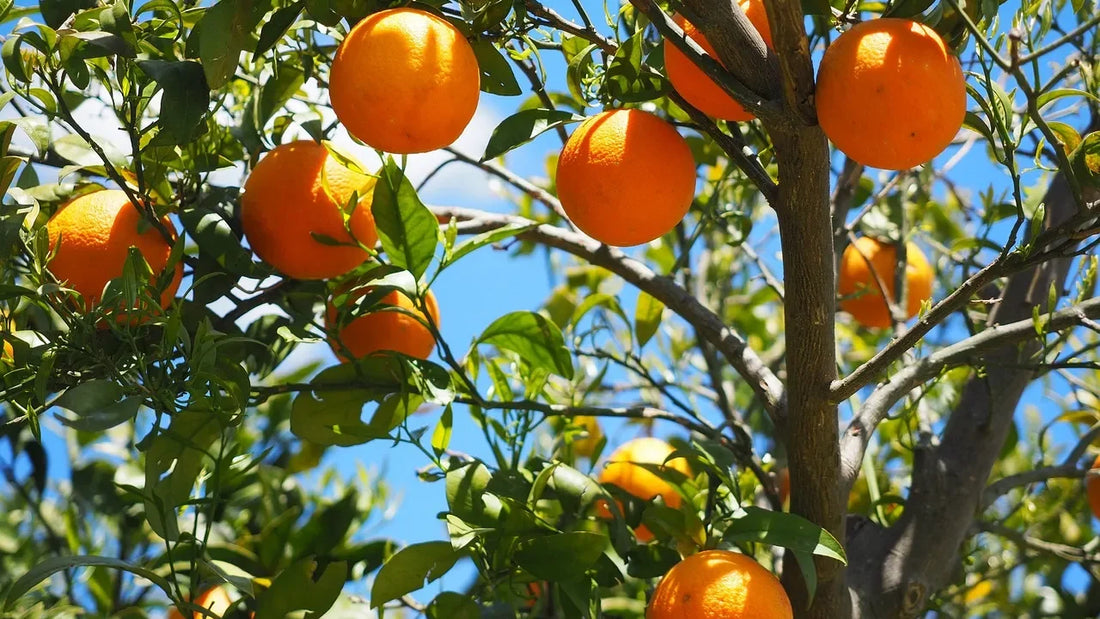

The Orange Tree, scientifically known as Citrus sinensis, is one of the world’s most beloved fruit-bearing trees, celebrated for its sweet, tangy fruits, vibrant blossoms, and cultural significance. Native to Southeast Asia, the Orange Read more
Trending
Trees for Corporates
Orange Tree: Vitamin C Powerhouse, Citrus Charm, and Fruity Goodness
You may also like
Corporate Plantations
Orange Tree Benefits
The orange tree is a vitamin-packed powerhouse, combining fruity goodness, citrus charm, and environmental benefits. It’s the tree that brightens gardens and boosts health with every juicy fruit.
Nutritional Value of Oranges
Oranges are loaded with vitamin C, fiber, and antioxidants. They’re the zesty snack that keeps colds away, improves digestion, and adds a burst of sunshine to your diet.
Growing Orange Trees
Orange trees thrive in sunny, well-drained soil. Plant one, and enjoy its fragrant blossoms, lush greenery, and a steady supply of sweet, tangy fruits.
Orange Tree Flowers
The delicate, fragrant blossoms of the orange tree attract pollinators and fill the air with a refreshing citrus aroma. They’re nature’s little perfume bottles.
Oranges for Immunity Boost
Packed with vitamin C, oranges are your immune system’s best friend, keeping illnesses at bay with their citrusy superpowers.
Orange Tree for Landscaping
With its glossy leaves, fragrant flowers, and vibrant fruits, the orange tree is a landscaper’s dream. It’s the tree that adds flair and function to any space.
Orange Tree Leaves
Orange tree leaves are used in teas and traditional remedies for their calming properties. They’re the unsung heroes of this fruity favorite.
Oranges for Skin Health
Rich in antioxidants and natural hydration, oranges rejuvenate skin, leaving it radiant and refreshed. They’re the beauty boost hiding in your fruit basket.
Orange Tree in Orchard Planning
Orange trees are a staple in orchards, offering high fruit yields and low-maintenance care. They’re the dependable stars of the citrus world.
Oranges for Culinary Delights
From fresh juice to zesty desserts, oranges add a burst of flavor to every dish. They’re the citrus chefs can’t get enough of.
Orange Tree for Eco-Friendly Gardening
Orange trees are not just beautiful—they’re also great for the environment. They purify air, attract pollinators, and require minimal resources to thrive.
Cultural Significance of Orange Trees
Symbolizing luck and prosperity, orange trees hold a special place in many traditions. They’re more than a fruit—they’re a slice of cultural heritage.
FAQ
What is the orange tree and why is it called a vitamin C powerhouse?
The orange tree is famous for its juicy fruits packed with vitamin C, boosting immunity and overall health. It’s the go-to tree for citrusy goodness and nutritional charm.
How can I grow an orange tree at home?
Growing an orange tree is easy. Plant it in sunny, well-drained soil, water moderately, and enjoy its fragrant flowers and delicious fruits.
What are the nutritional benefits of oranges?
Oranges are rich in vitamin C, fiber, and antioxidants, supporting immunity, digestion, and skin health. They’re the tangy treat that’s as healthy as it is tasty.
Why are orange tree flowers special?
Orange tree flowers are fragrant and attract pollinators, adding beauty and biodiversity to your garden. They’re the tree’s aromatic prelude to delicious fruit.
How do oranges boost immunity?
Oranges are packed with vitamin C, which strengthens the immune system and helps fight off colds and illnesses. They’re your natural citrus shield.
What makes orange trees great for landscaping?
Orange trees add flair with their glossy leaves, fragrant blossoms, and vibrant fruits. They’re functional and fabulous, making them perfect for any garden.
Can orange tree leaves be used for health benefits?
Yes! Orange tree leaves are used in teas for their calming properties. They’re the hidden gem of this citrus wonder, offering relaxation with every sip.
How do oranges improve skin health?
Oranges are rich in antioxidants and hydration, rejuvenating the skin and giving it a radiant glow. They’re the fruit aisle’s secret beauty treatment.
Why are orange trees important in orchards?
Orange trees are a staple in orchards for their high fruit yields and low maintenance. They’re the reliable citrus stars of any fruity collection.
What are the culinary uses of oranges?
Oranges enhance dishes with their tangy flavor, from fresh juices to zesty desserts. They’re the versatile fruit that makes every meal brighter.
How are orange trees eco-friendly?
Orange trees purify air, attract pollinators, and require minimal resources to grow. They’re the green choice that’s as kind to the planet as they are to your plate.
What is the cultural significance of orange trees?
Orange trees symbolize luck and prosperity in many cultures, especially during festive occasions. They’re more than a tree—they’re a citrusy charm for good fortune.
Most Popular
Connect with us
-
👥 Corporates
If you are looking for:
- 🌲 Tree Plantation Events
- 📊 CSR Projects
📧 corporate@growbilliontrees.com
📞 +91 9699723523
💬 +91 9325931304 WhatsApp (Only)
🕒 Mon - Sat | 10am - 7pm IST
-
🧩 Tree Plantation NGOs
If you are looking for:
- 💰 Financial Assistance
- 🤝 Operational Support
📧 support@growbilliontrees.com
📞 +91 9699723523
💬 +91 9325931304 WhatsApp (Only)
🕒 Mon - Sat | 10am - 7pm IST
-
🌼 Individuals
If you are looking for:
- 👥 Group Tree Plantation Drive
- 🌳 Bulk Tree Plantation
📞 +91 9699723523
💬 +91 9325931304 WhatsApp (Only)
🕒 Mon - Sat | 10am - 7pm IST





















